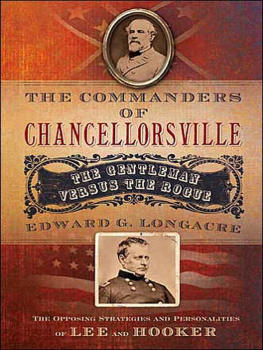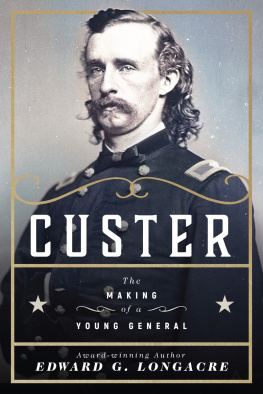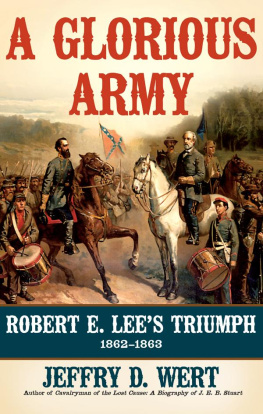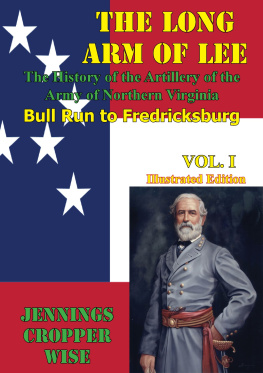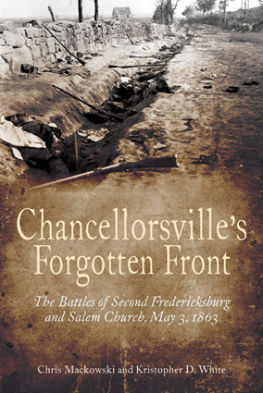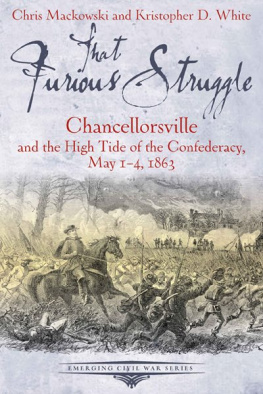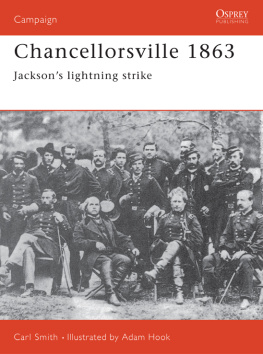THE COMMANDERS
OF
CHANCELLORSVILLE
Edward G. Longacre
Rutledge Hill Press
Nashville, Tennessee
A Division of Thomas Nelson Publishers
www.ThomasNelson.com
Copyright 2005 by Edward G. Longacre
All rights reserved. No portion of this book may be reproduced, stored in a retrieval system, or transmitted in any form or by any meanselectronic, mechanical, photocopy, recording, or any other except for brief quotations in printed reviews, without the prior permission of the publisher.
Published by Rutledge Hill Press, a Division of Thomas Nelson, Inc., P.O. Box 141000, Nashville, Tennessee, 37214.
Rutledge Hill Press books may be purchased in bulk for educational, business, fundraising, or sales promotional use. For information, please email SpecialMarkets@ThomasNelson.com.
Library of Congress Cataloging-in-Publication Data
Longacre, Edward G., 1946
The commanders of Chancellorsville : the gentleman vs. the rogue / Ed Longacre.
p. cm.
Includes bibliographical references and index.
ISBN 1-4016-0142-1 (hardcover)
1. Chancellorsville, Battle of, Chancellorsville, Va., 1863. 2. Lee, Robert E. (Robert Edward),
18071870. 3. GeneralsConfederate States of AmericaBiography. 4. Hooker, Joseph,
18141879. 5. GeneralsUnited StatesBiography. 6. StrategyCase studies. 7. Command of troopsCase studies. I. Title.
E475.35.L66 2005
973.7'33dc22
2005015172
Printed in the United States of America
05 06 07 08 095 4 3 2 1
In Memory of My Uncle,
PFC Albert G. Weisser, U.S.A.,
351st Infantry Regiment, 88th Division,
KIA, Italy, 25 September 1944
Table of Contents
M y first debt is to Rod Gragg of Conway, South Carolina, for suggesting a need for this book and urging me to write it. I also thank my publisher, Larry Stone, of Rutledge Hill Press, and my editor, Geoff Stone.
For providing source materials on Robert E. Lee I thank Toni Carter and Greg Stoner of the Virginia Historical Society, John and Ruth Ann Coski of the Museum of the Confederacy, and the reference staffs of the University of Virginias Alderman Library and the College of William and Marys Earl Gregg Swem Library. For making available the unpublished papers of General Hooker, I am indebted to John Rhodehamel of the Henry E. Huntington Library, Jon Stayer of the Pennsylvania State Archives, and Lauren Eisenberg and Sandra Trenholm of the Gilder Lehrman Collection. Cheryl Nabati at the interlibrary loan desk of the Bateman Library, Langley Air Force Base, provided me with numerous hard-to-find sources.
For perceptive observations about Lee, the soldier and the man, and for developing an in-depth personality assessment of Joseph Hooker, I thank Professor Gary Leak of the Department of Psychology, Creighton University. Debbie Pogue of the United States Military Academy Special Collections provided valuable information about the academic careers of both Lee and Hooker. Robert Oliver of Newport News, Virginia, helped shape my theory of the military applications of chess and poker. And Ted Zeman of Philadelphia, Pennsylvania, supplied me with Hookers post-battle congressional testimony, which constitutes the generals only published report of Chancellorsville.
The illustrations for this book were prepared for publication by Bill Godfrey of Hampton, Virginia, and the maps were drawn by my long-time cartographer, Paul Dangel of Berwyn, Pennsylvania. For research assistance and moral support throughout the project, I am indebted, as always, to my wife, Melody Ann Longacre.
M ilitary historians are fond of describing battles in terms of a chess match in which kings, queens, bishops, knights, rooks, and pawns i.e., combat unitsare moved strategically across a precisely patterned board of playi.e., the battlefieldtoward an ultimate goal of conquest, the capture and killing of the opponents most critical piece. To some extent, the chess analogy has much relevance. Chess, like warfare, emphasizes the need for planning ahead and plotting contingencies. Chess strategy rests on the ability to preserve a players strength while tricking his or her opponent into expending strength via complex maneuvers. Misdirection and deception are key elements in the game. Pure skill determines the victor and the vanquished. Chess nomenclature even mirrors the vocabulary of combat. Players are known as friend and foe, the rows on the chessboard are ranks and files, and the basic maneuvers of chess are described as attacking and defending.
Yet there are limitations to viewing warfare through the prism of chess strategy. At the start of every game, the opposing forces are evenly matched. With few exceptions, chess pieces have strictly defined ranges and capabilities. Chess moves often conform to venerable patterns recognizable to ones opponent. Most significantly, at any point in a match a player can view the full range of an opponents resources and gauge the power those resources represent. These advantages and others available to chess players are hardly characteristic of actual warfare.
If the chess analogy falls short, one might more profitably describe military operations in terms of poker. In contrast to chess pieces, the cards dealt to a poker player are not fixed properties. The value of a card changes in relation to the other cards in a players hand. So, too, can the power and capability of military resources shift in relation to time, terrain, the commitment of friendly forces, the intervention of enemy units, and a host of other variables. As in warfare, the stakes of a poker game escalate as the game progresses and the bidding mounts. And while a resourceful poker player can estimate the value of an opponents hand, that value cannot be determined precisely until the cards are laid on the table. Although often portrayed as high-stakes risk taking, poker is essentially a game of risk management via various stratagems such as deception and bluff. These characteristics likewise define the art and science of warfare.
The gaming analogy has been applied to many wars in many eras, but perhaps no more frequently than to the American Civil War. A battle that lies at the midpoint of that long and bloody conflictChancellorsville, fought in eastern Virginia during the first four days of May 1863offers a near-perfect example of the interplay of chess and poker strategies. The ranking antagonists in that complex and sometimes confused clash of armsGen. Robert Edward Lee, commander of the Confederate Army of Northern Virginia, and Maj. Gen. Joseph Hooker, leader of the Union Army of the Potomacwere defined by sharply contrasting combat philosophies. These philosophies can be viewed as embodying the fundamental differences between chess and poker play.
The fifty-six-year-old Lee, one of the most distinguished soldiers of the prewar United States Army and by mid-1863 the Confederacys most successful field commander, practiced war in the manner of a chess master. He fought according to carefully patterned modes of warfare, especially those propounded by Baron Antoine Henri Jomini (17791869). The Swiss historian, whose tactical analyses of the campaigns of Napoleon and Frederick the Great made him one of the most influential military theorists of the early nineteenth century, bequeathed to Lee and other disciples a set of tactical and strategic maxims which, if adhered to with precision and thoroughness, virtually guarantee success on the field of battle. In sharp contrast, the forty-eight-year-old Hooker, like Lee a West Point graduate but no student of Jomini, was an inveterate poker player whose gamblers mentalitya unique combination of nerve, braggadocio, and bluffforever colored his approach to warfare.
The opposing commanders posed a striking contrast not only in their strategic and tactical philosophies but also in their personal characteristics. Scion of one of Virginias oldest familiesson of Light-Horse Harry Lee, George Washingtons cavalry commanderRobert E. Lee was a gentleman born and bred. He exuded rectitude, respectability, and erudition (he was graduated from the Military Academy in 1829 second in his class, with not one demerit on his conduct record), and he carried the mantle of authority with the ease and grace of the genuine aristocrat.
Next page
